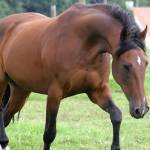Exercise and Immune Response in Younger and Older Horses

Horses need regular exercise to keep their musculoskeletal systems in good condition. Studies have been conducted to measure the effects of various levels of exercise on other systems in horses of various ages. Six older mares (average age 25 years) and six young mares (average age 7 years) were used in a trial designed to determine the effect of exercise on the immune responses of young and aged horses. Treadmill exercise for each horse consisted of a two-minute trot at a moderate speed and then a gradual increase in speed until the target heart rate (160, 180, or 200 beats per minute) was achieved. Blood was collected before and immediately after exercise and analyzed for cortisol, an indicator of stress, and plasma lactate. Various measures of immune function were also determined for both groups of horses. All horses had a history of regular immunizations against equine influenza, and each horse received the second dose of an equine influenza vaccine one month prior to the start of exercise. Serum antibodies were determined at the start of the exercise protocol and after all exercise bouts had been completed.
The level of plasma cortisol increased in all horses following exercise, but concentrations were higher in younger horses than in older horses. Plasma lactate levels also increased with exercise intensity, but there were no differences between younger and older horses. Samples taken before exercise showed a lower immune response among the older horses than in the group of younger horses. Younger horses showed a drop in immune response only at the highest exercise level, while no similar drop was seen in the older horses. The levels of antibody titers to equine influenza virus antibodies were 10 times lower in older horses than in younger horses before exercise, and no effect of exercise was seen on titer level in either group.
Equine immune function is known to decrease as horses age, and several mechanisms may be involved. Nutritional deficiencies (protein malnutrition, amino acid imbalances, mineral imbalances) or declining levels of growth hormone have been suggested as causes. Though the older horses in this study were fed based on specific nutritional needs for their age, a drop in immune function was still seen. Mares that were given supplemental growth hormone showed some physiologic effects but did not show an improvement in immune response.
In some species, higher concentrations of plasma cortisol are seen in older animals following exercise. It is theorized that the higher cortisol levels are due to a decrease in cortisol receptors in the brain of aging animals. In this study, concentrations of cortisol were higher in younger horses rather than in older horses. Interactions are extremely complex between various hormones and selected neurologic and physiologic systems, and no clear explanation was found for this unusual result.
Based on this study, supplementing older horses with growth hormone or switching from one well-formulated feed to another will not impact immune response in older horses. In young horses, immune levels may be negatively influenced by intense exercise, but are probably not threatened by moderate exercise.








